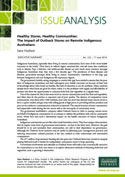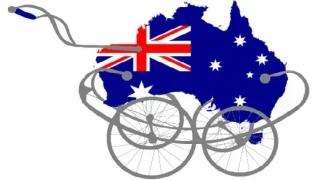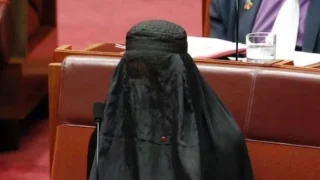
Indigenous Australians, especially those living in remote communities, have some of the worst health outcomes in the world. Diets heavy in refined sugars, saturated fats, and salt mean that conditions such as obesity, Type 2 diabetes, and cardiovascular disease are now much more common amongst Indigenous Australians than they were a few decades ago. The prevalence of these diseases and illnesses, particularly amongst those living in remote communities, contributes to the large gap between Indigenous and non-Indigenous life expectancy figures.
The government’s healthy eating campaigns to combat this ‘gap’ have tended to assume that the poor diets of Indigenous Australians and their subsequent poor health outcomes are because of their lack of knowledge about what foods are healthy. But lack of education is not the problem. Many residents already know what foods are good for them; rather, it is the problems with supply and affordability of produce that limit the opportunities to consume fresh fruit and vegetables on a regular basis.
One of the reasons for this is that most stores in remote communities stock few fruit and vegetables, and when they do the produce is expensive and of poor quality. The absence of competition (most communities, even those with 1,000 residents, have only one store) has allowed many remote stores to have a captive market and get away with selling goods at high prices or providing inferior products and poor service without a commensurate reduction in demand. The remote location of most communities and impassable roads during the wet season add to the monopoly of community stores.
The government established a company called Outback Stores in 2006 to manage remote stores on behalf of Indigenous communities in an attempt to address the problems with remote community stores, which have had such a detrimental impact on the health outcomes of remote Indigenous Australians.
Indigenous communities are not like other small Australian towns. They have unique characteristics that do require some form of government intervention—at least in the short term. However, the goal should be to try and normalise these communities, not add to their dependence on government.
Although the Outback Stores initiative may be useful in addressing poor management practices and reducing uneconomic cultural practices, it has also resulted in some unfortunate and unintended consequences.
The $77 million of government funding that has gone into Outback Stores has created an unequal playing field and made it harder for independent community stores to keep operating.
Government involvement and subsidies to Outback Stores will make it less economically attractive for communities to run their own stores or to explore alternative methods of obtaining fresh fruit and vegetables, such as growing it themselves.
Outback Stores should not be allowed to operate in communities of 500 or more because the funding it receives from the government has the potential to stifle any competition. Rather than imposing top-down, government controlled measures, the government should support and propagate those community store initiatives that are working well. Government should never assume that only it can bring about effective change; indeed, without community engagement (buy-in) any measures will only be another example of government doing something for communities, not with them.
Government intervention into remote stores should be confined to monitoring and regulating stores practices. Until the introduction of store licensing for income management, stores were not monitored to check whether they were meeting normal health and safety standards and following food hygiene practices. But the carrot of being awarded a licence to accept the BASICS card has seen stores improve their practices.
The Rudd government established an inquiry in December 2008 on remote Indigenous community stores with a particular focus on the role of Outback Stores. The report by the House of Representatives Standing Committee on Aboriginal and Torres Strait Islander Affairs was released in November 2009 and contained a total of 33 recommendations. But more than six months later, the Rudd government is yet to respond to the recommendations, even though it has been government policy to do so within three months of a report being tabled.
This, and the absence of funding for the Council of Australian Government’s Food Security initiative and the National Aboriginal and Torres Strait Islander Nutrition Strategy and Action Plan 2000–10 in the federal government’s 2010 Budget, suggests that the Rudd government has put this issue on the back burner.
Like previous government attempts to improve healthy eating practices in remote communities, Outback Stores is a bandaid solution and does not address the structural impediments to reform, such as the absence of private property rights and the Permit System. Tourism helps support local shops in other small, rural Australian towns, but many Indigenous communities are kept isolated by the Permit System, which requires visitors to get permission before travelling to or even through Indigenous communities. Only when these factors are addressed will there be a true market economy and the benefits of increased competition in remote Indigenous communities.
Sara Hudson is a Policy Analyst in the Indigenous Affairs Research Program at The Centre for Independent Studies.











